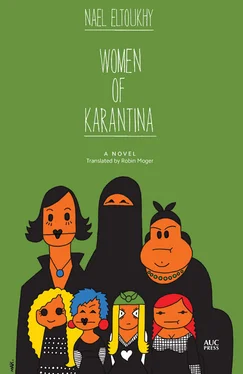What did Umm Salah mean by greed? And how did greed bring about Nadia and Itemad’s tragic end? Umm Salah talked on. It was winter, and as was usual in winter the customers were few, while Alexandria’s reputation was sliding into the mud, victim of the feuds between Ali’s and Sousou’s families, and people cowered at home. Rent was due and deposits on everything they owned were left unpaid. Itemad’s husband was a violent man. The most violent and least cautious of them all. He brought an Emirati businessman to the apartment. Led him to a bedroom at the back, where the man bedded one of the girls, and at that point, with the businessman naked, his buttocks cocked in mid-air (Umm Salah held her hands apart and added with a smile: And what an ass he had on him, good Lord!), the husband burst in. He photographed him with his camera phone, then demanded he hand over every penny he had, plus his Visa card and the keys to his car and apartment. The Emirati refused. He refused in the strongest terms and tried to strike the husband. There was a fight, and when the Emirati started to scream the husband clamped his hand over the man’s mouth. After a few minutes of this, the Emirati slumped lifeless to the floor before the girl’s terrified eyes.
Umm Salah is high as a kite now. She slumps to the floor. Lara approaches her. After a minute she comes to, shakes violently, and continues:
Once, twice, three times and that lot had the move down pat. They started bringing in wealthy clients and murdering them. Itemad wasn’t happy. Always saying, Hasaballah, we were doing fine. Why are we getting involved in this now? (She pauses; digresses.) Hasaballah was her husband. His name was Ahmed Hasaballah and they called him Hasaballah. Nadia’s husband was Abdel Aal: Mohamed Abdel Aal. It was the men who started it, but the women didn’t object, if you see what I mean. And anyway, the two ladies were helping out: they’d bring people round, customers and suchlike, take their money, make them sign over their things, and then they’d murder them. It was a huge deal at the time. Everybody knew about it.
Was Umm Salah raving under the influence of the hash? Lara couldn’t tell exactly. Most likely, the general outline of the story was true, but the details were debatable. In the days that followed, some people told Lara that Hasaballah had been Nadia’s husband, not Itemad’s, and that Abdel Aal had been married to Itemad, not Nadia, and some people said that Nadia had never been married, and that Itemad had a husband called Bekheit who was from Sohag. Whatever the case, the names didn’t matter; what mattered right then was what took place, to wit: that Karantina was not the only well-spring of revolutionary fervor in Alexandria. Never! Who said such a thing? Umm Salah went on. The whole of Alexandria was up in arms, from Miami to Bahari, from Agami all the way down to Maamoura. The government in Cairo was tearing its hair. Who are these people? Who are these people setting the whole world on fire like this? Who are these people, all manliness and toughness? Alexandrians are no pushovers, my girl. And they’re an ancient people too, with a beautiful culture that we’re all so proud of.
The Freedom Casino in Labban claimed four victims: two men and two women. Fifty-fifty: we don’t discriminate (a smile). The police were really dragging their feet, which gave Nadia and Itemad time to take precautions. They sold the two apartments, which they’d gone and bought outright, and moved with their husbands to Mansoura. And there they picked up where they’d left off, a career in which murder rubbed shoulders with prostitution, with the wails of the baffled and the bereaved, with mothers’ tears.
Umm Salah tells another tale: Hasaballah and Abdel Aal — with the assistance of a third thug, by the name of Arabi — started to put pressure on Nadia and Itemad. Their demands grew, even though they weren’t pulling their weight. The two ladies considered getting rid of them. Nadia lost her nerve and Itemad kept at her, trying to convince her. Nadia was a coward, a drunk, and she vacillated. Itemad was strong; feared no one but her Maker. In the end they reached a compromise: they would poison Arabi, and this would send a stern message to Hasaballah and Abdel Aal. And so it was. Arabi was eating fish with them and all of a sudden he was curled up on the floor, screaming. Hasaballah looked at Abdel Aal — they got it — and as if instinctively the two women and their husbands dropped to their knees to stifle his screams. When the life was gone out of him for good, they set about stripping him bare: a nine-millimeter automatic, three thousand pounds, a Visa credit card, a cell phone, a leather jacket, gallabiya, shoes, and an expensive watch. Together they carried him away to dump him in the wasteground beneath the building.
That night the husbands would sit with their wives in the apartment, Hasaballah despondently rolling a joint and gazing up at the ceiling from time to time and muttering, The dead men down below, the dead men down below, while Abdel Aal buried his face in his hands, crying like a baby, the words coming indistinctly from the back of his throat, something like, It’ll all come out. And all night long they looked over at their wives mistrustfully. The message had hit home.
Nadia and Itemad. Two names that filled the skies over Alexandria, over the whole world, when investigations with relatives of the missing started to point to them. They were arrested just months after Hasaballah’s first murder. And the investigations uncovered more: a far-flung criminal network, the deliberate policy of marginalization to which the two men, Hasaballah and Abdel Aal, had been subjected by their wives, leaving Nadia and Itemad to run the show, luring in the johns, killing them, and taking possession of their cash and assets, and leading, eventually, to these same husbands giving evidence against their wives. Men envy women, Lara; they don’t love them and they wish them ill. It was their husbands who brought Nadia and Itemad down, no one else. Here Umm Salah came to the end of her story, to the moral of her tale: Left to their own devices women can achieve whatever they want, and that’s why I don’t want you or your sister to worry. You’re only girls, it’s true, but girls these days are something to be reckoned with. The Good Lord, may He be praised and glorified, says that girls are the glory of this lower world.
These last few lines came out disjointed. Umm Salah was practically asleep when she delivered them. She dozed off briefly, then came to and finished her thought. Lara could see the state she was in. She fetched her a blanket, covered her up, and left the building. It was nine-thirty in the morning. The traders were opening their stores, the sun beamed down on all and sundry, and Lara felt that she was strong. Strong and free and capable of anything.
These were the best days of Yara’s life, no doubt about it. She lived in her own building, under the protection of the man she loved; her men churned out victories over the men of Amira, Minnatallah’s daughter; and everyone treated her with the respect she deserved. We’d be telling a lie if we said that the thought of marriage had never occurred to Yara before. The truth was, she’d thought of nothing else. Take her bed, mute witness to her incessant masturbation, or the porn sites where she boned up with bated breath. Now Yara: she had achieved everything she longed for; she lacked for nothing — except the part of the tunnel annexed by Amira’s men. That was not going to be easy. It was worrying, especially in light of reports of renewed attacks on her men, of the vast quantities of weapons owned by the enemy. Yara began to fret. From the window she looked for Yehya Volcano and saw him sitting at the café with his friends, drinking and playing for money, for very large sums of money. A fear flitted through Yara’s mind, faint and alarming: she felt that she was alone in the world. These were the worst days of Yara’s life, no doubt about it.
Читать дальше












